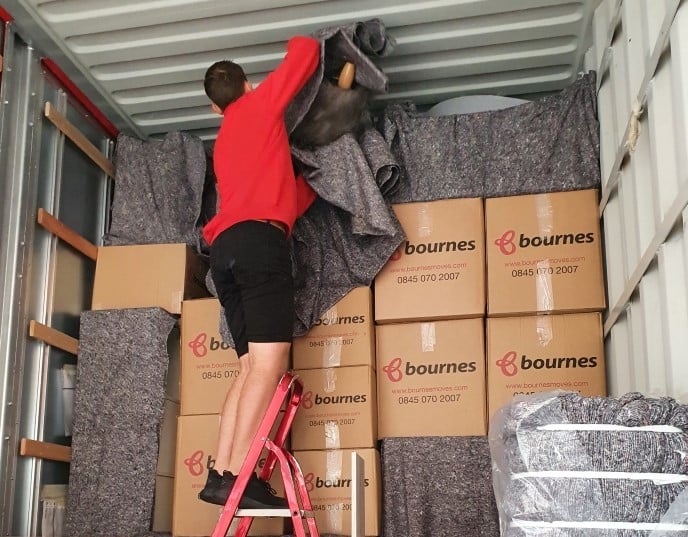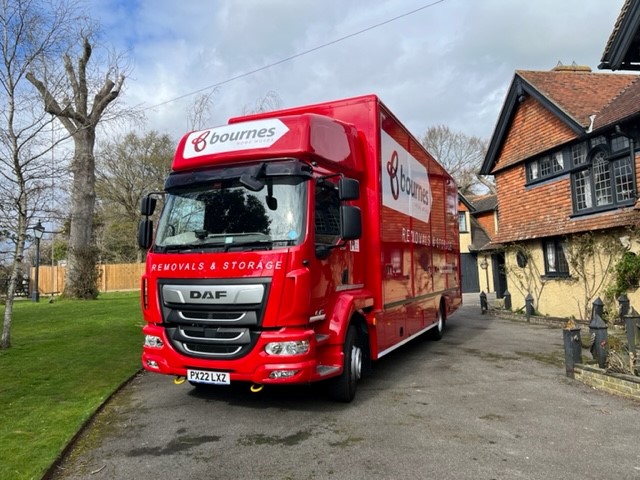One of the most common questions about removals to Europe is "how much will my European removal service cost?" The answer is not as simple as it may seem.
IIn this article we will explain how European removal costs are calculated, why the cost between different removal companies can vary and share some tips to keep your costs as low as possible.
There are 3 main elements that determine the cost of European Removals services.
- Collection Services at origin - packing, wrapping, loading and any other assistance you may require.
- Transport - moving your belongings from your origin property to your new home - including road transport and the train or sea Channel crossing.
- Destination Services - customs clearance, delivery, unpacking and any other set up support you've chosen.
We will explain these in more detail below.
How much does A European removal company cosT?
How do we calculate International Removal costs?
Within the 3 areas of origin services, transport and delivery services there are lots of factors that we assess before calculating your removals costs. We'll break each of these down below, but here's the main ones:
- Volume of goods
- Transport service
- Type of goods
- Speed of shipment
- Origin and destination
- Services
- Move plan
- Special requirements
- Access
- Move Dates
1. Volume of Goods

The size of your move (aka "volume") usually has the biggest impact on cost. Volume determines how many people you will need to pack and load, and how long that will take; the amount of packing materials; the size of vehicle you'll need and fuel that will use; how long it will take to unload etc.
Curious to know your volume? check out our volume calculator.
Volume also usually partly determines the method of transport you will use.
2. Method of transport

For mainland Europe most moves will travel by road. Most European Removal Companies offer different service levels for transport based on the size of your move, how quickly you need your belongings and whether you'd like to share a vehicle to reduce your costs if this is an option for you.
Generally, the transport methods fit into the following 3 categories, although each company may call the service something different.
Part Load Service (a.k.a Groupage / Economy):
Sharing a vehicle (and transport costs) with other customers moving along a similar route. Best for small/medium moves when you can be flexible on dates.
Dedicated Dates Service
Fixed dates to suit your schedule, with other customers working around you to fill any space on your vehicle to share the transport costs. Best for moves where dates are important but you don't mind sharing a vehicle.
Dedicated Dates Service
Fixed dates to suit your schedule and a dedicated vehicle for your own exclusive use. Best for larger moves or unique shipments.
Read more about transport options for European Removals to decide which method might be right for you.
3. Type of Goods

Whilst most household goods are simple to move within Europe there are some items that can add additional cost to your move e.g.
- Fragile items that need crating or extra packing protection.
- Heavy/awkward items that need special handling.
- Large items that require dismantling/reassembling.
- Restricted items (e.g., weapons or alcohol) that require additional processes to be completed to customs clear them.
4. Speed of delivery
Typically the more flexible you can be on move dates, the cheaper the cost. If you need your items to arrive at your new home quickly dedicated dates or dedicated vehicle services will be best for you, but if you are happy to work around the removal company's own schedule a part load service may be more economical for smaller shipments.
Air freight shipments are the quickest mode of transport and are sometimes used in addition to a road shipment for important items like baby equipment or clothes if your main shipment won't be quick enough.
5. Origin and Destination

Cost of fuel and the amount of time a driver is paid to travel varies for routes between different countries, so removals from the UK to France will have different transport charges to removals from the UK to the Netherlands.
6. Services
Most professional European Removal company services will include loading, transport, customs clearance and unloading (always a good idea to check this though as smaller man and van companies may not provide all of these).
Many companies also offer extra services either in house or through partners to make your move easier, so consider if you'll need to add this into your budget.
- European grade packing services
- Insurance
- Crating of fragile items
- Handyman services to dismantle items or take down pictures/shelves etc. ready to move.
7. Move Plan
If you have any specific constraints for packing and loading or delivering your move this might impact the cost (for example if a completion day is involved). Your removal company will plan and recommend the most cost effective way of carrying out your move and the associated schedule. If that doesn't work for you they might be able to amend this to suit so just ask (note it may cost them more to do the move a different way, so check if altering the move plan affects your charges).
8. Special requirements
Special requirements such as out of the ordinary items or additional collection or delivery points can add to the cost of a move as these may take additional time, equipment etc.
9. Access

Most moves involve standard access but if you've got any access challenges this could add to the cost of your move for example:
- long carry from the front door to nearest vehicle parking.
- narrow lanes or low bridges that prevent a removal vehicle getting close to your home.
- lots of internal or external stairs.
- doors/hallways that are too narrow for larger items.
- Vehicle restrictions in the area you're moving to (e.g. in some places only electric vehicles are allowed).
Access restrictions can usually be overcome but might require additional time or equipment to handle, for example hiring of an external elevator, extra crew or a shuttle vehicle.
10. Move dates

When you want to move can have a big impact on the cost. Peak periods (for example school holidays) when demand is high can mean higher prices. Moving on a weekend or bank holiday will also usually mean higher charges as companies typically have to pay their staff more to work unsocial hours.
If you can be flexible on your move dates ask your removal company what dates they can offer the best price for.
11. Type of Removal Company
The type of removal company you choose will also have an impact on how much you're likely to pay. Like any service providers the quality standards between different companies vary, and you may pay more for a higher quality of service.
Companies that have achieved quality certifications and professional accreditations have invested in their processes, staff and resources to reduce the risk of anything going wrong during your move, so always ask what their qualifications are and look for FIDI FAIM certified companies.
You can also check the reviews of different providers on independent review sites like Trustpilot.
How much will MY European move cost?
The best way of getting an accurate price for YOUR move is to arrange a home visit with a European removal company. This move consultation should always be free and provide you with a no-obligation quotation which will help you find out what you really need to budget and ensure there are no nasty surprises when you come to your move.
Why are different European Movers prices so different?
We’re also often asked how different companies' prices can be quite varied, even if they all meet the same standards and are quoting on the same services?.
The first thing to check is that you are comparing your quotations are like for like and making sure quality levels are the same. Check out this blog post to help you compare the soft factors. Comparing removal company quotations.
Even when quotes are like for like there are other factors that might mean your costs are higher or lower than others, probably too many to list but here’s some scenario’s that give you an idea.
- If you’re the last customer that fills up a part-load vehicle the company might discount your quotation to encourage you to book with them so that they can fill the truck and get it on the road to improve service times for all customers
- If they already have a vehicle in your area to do the collection they might be able to split some of the transport costs with the other customer(s) to allow everyone a discount.
- If the removal company has a quiet week or day they might discount your move as they’d rather do a move at cost than have to pay staff who have no work to do.
- Alternatively, if it's peak season or one company is already fully booked you may have to pay a higher premium to get your company of choice.
So, as you can see “what is the cost?” and “why does it vary so much?” are similar to asking “how long is a piece of string?” – the best way to find out if you’re not sure is to ask your moving company directly. They should be honest and transparent in their pricing and should be happy to tell you how they arrived at their costs to give you the confidence you’ll receive the service you’re looking for.
International packing costs

When you ship your belongings to Europe, which is technically an overseas move, it's a good idea to get your removal company to do the packing for you and include the cost in your budget.
Packing services are charged on the amount of time it takes to pack and the materials required.
Why do I need professional packing?
The longer the distance your move needs to travel, and the more modes of transport it uses (i.e. road/sea/rail) the higher the risk compared to a local move. Professional packing reduces the risk of things getting broken in transit, which could be costly to replace.
Are there any other European moving costs I need to be aware of?
Depending on where you are moving from or to there may be other additional costs that your removal company should explain to you in advance of your move.
These could include:
- Duties and taxes - most household goods moves are free of duties and taxes, but depending on the contents of your shipment and your eligibility for duty free imports you may face additional charges from customs and excise. This could include taking alcohol or new furniture, or if you're moving items for a second home rather than your main residence. Your removal company should help you determine this in advance.
- Storage - if you are unable to take delivery of your belongings right away ask your removal company to explain their costs for storage.
- Insurance - it's important to arrange international removals insurance when you move household goods within Europe. The cost for this should be shown in addition to your removals costs and is usually based on the declared value of your belongings.
It is always important to ask your removal company if there are any additional costs or exclusions you should be aware of in advance of booking your move. They should be open and transparent, and happy to explain these charges - nothing should be a surprise!
5 Tips to reduce EUROPEAN moving costs
Here are our top 5 tips to help you keep your move costs as low as possible:
- Declutter to reduce the volume of goods you need to pack and move.
- Be flexible on the collection and delivery dates.
- Don't move on a weekend or during school holidays.
- Move with a company that is FIDI FAIM certified (this will reduce the risk of any hidden costs if something goes wrong!)
- Make sure your belongings are properly insured for the move (the cost of insurance will seem low compared to having to replace expensive items if they are damaged).
Want to know more about EUROPEAN Removals?
Check out our European Removals Guide to find out everything you need to know to find a great mover and have a smooth move.

.png)










